- Home
- Amelia C. Adams
An Agent for Cynthia Page 4
An Agent for Cynthia Read online
Page 4
As Cynthia glanced around at the plates in front of the other diners, she wasn’t overly impressed. The food looked simple and bland—she hoped that in this case, looks were deceiving.
They weren’t.
She and Corbin both poked at their food until the bellboy returned. “The gentleman had a return message all set for you, sir,” he said, handing a folded slip of paper to Corbin. “It’s like he knew your note was coming.”
“I imagine he did,” Corbin said mildly. “Thank you.”
“You’re welcome, sir.” The boy gave a nod, then moved off to help someone else.
Corbin unfolded the note. “Carlson wants to meet us at ten in a small park a few blocks from here,” he said, tucking the paper in his pocket. “We’re to sit on the bench and wait for him to find us, and then we’re not to make eye contact with him.”
“He’s afraid he’s being followed?” Cynthia asked. There was no one else in their corner of the dining room, so she felt more confident about asking questions than she had at their previous meals.
“Yes. That will make things more complicated.” Corbin took a sip of his coffee, then grimaced. “After our meeting, let’s find a decent place for lunch. A person could starve to death eating here.”
“Agreed.”
They finished their coffee, which was the least reprehensible thing on the table, then went upstairs to gather their things. They were going to take the conductor’s advice and find a new hotel. This one had been fine in a pinch, but with so many other options, there was no reason to settle for bad food, and Cynthia was sure that on a night when she wasn’t so exhausted, she’d feel every lump in that mattress.
Chapter Four
Corbin and Cynthia took seats on the bench Agent Carlson had indicated in his note, then Corbin turned his attention to analyzing the park. If Carlson was being followed, his followers would need hiding places to observe him, and Corbin identified some trees that would fill that need. He’d have to be sure that they never raised their voices loudly enough to carry over that distance, and he’d want to be sure that they didn’t get a close look at him or Cynthia.
He smiled to himself at the thought. If they were observed, it actually didn’t matter so very much—they’d each disguised themselves to look quite different. They’d stopped in at a ready-made clothing store and purchased a few things, including some men’s trousers and a hat for Cynthia. Whoever was following Harold Carlson would only see him sitting near a man and a boy, not a man and a woman.
“I’ve never felt so conspicuous in my life,” Cynthia muttered. “I can’t wait to change.”
“I don’t know. I think you look rather fetching,” Corbin replied, knowing that would only agitate her further, and he was right. She gave him quite the scowl before turning her attention back to the path in front of them.
A few minutes later, a man shambled by, paused, and plunked down on the bench next to them. He reached into his pocket and pulled out a letter, which he pretended to read as he spoke to them.
“Morning,” he said, his lips barely moving. “Code?”
“834634,” Corbin replied. “And you?”
“3445829.”
Corbin nodded. This was Agent Carlson. “Have you been followed?”
“Can’t say for sure, but I always act as if I am. No sense taking chances.” Carlson turned his letter over to study the other side. “Kade Brown has recently changed his living arrangements. He’s living at the Brookside Hotel, room 203. If you go there before nightfall and if he agrees to take you on as clients, he’ll arrange for you to stay there at the Brookside. That’s so he can keep an eye on you, but it’s handy because you can also keep an eye on him.”
“Who shall we say sent us to him?” Corbin asked
“Tell him that Richard Michaels sent you. Richard’s a long-time trusted associate—that name should open doors for you.”
Corbin nodded. “What else?”
“I believe that’s all you need for right now. I’ll be in touch.” Carlson folded up his letter, tucked it back in his pocket, and strode off.
“That wasn’t very helpful,” Cynthia said, shaking her head at the agent’s retreating back. “I thought he’d have a lot more to tell us.”
“He may yet have quite a bit to tell us. He likely didn’t want to call attention to us, so he made this first contact as quick as possible. We’ll have many other opportunities to speak with him, I’m sure.” Corbin glanced around. He hadn’t been able to identify anyone who might have been following Carlson, but that didn’t mean they weren’t out there.
“Let’s go change and get some lunch, then discuss how we’re going to handle our first meeting with Mr. Brown,” Cynthia said. “And I do mean that about changing—I never thought I’d say this, but I miss my multiple petticoats and my floor-length skirt. I’m sure trousers are quite comfortable for you men, but I feel unbearably awkward.”
“I think you’re rather adorable.”
“Adorable or not, let’s take me somewhere I can change.”
They had told the lady at the store that the pants were for Corbin, and Cynthia had slipped into them and snuck out of the store while he paid. Allowing her to change back was going to be a bit more complex, Corbin feared.
They chose a place to have lunch, and Cynthia spotted an alley behind the restaurant. She pulled her skirt from her bag and put it on over her trousers, then removed the trousers while Corbin stood guard, his back to her. He shook his head, smirking a bit—it wasn’t uncommon for him to seek out unusual places to change from one disguise to another, but he’d never paused to consider what that would mean for a female agent. There was a new level of complication, and he’d have to be mindful in the future of what Cynthia needed.
“All right,” she said. “I’m ready.”
Corbin turned and saw her stuffing her trousers into her bag. “Do you feel better?”
She sighed. “Oh, so much better. I always thought that trousers looked so freeing, but honestly, I felt exposed. I wasn’t made to be a boy.”
Corbin grinned. “I like you better as a young lady too.”
He’d already pulled off his outer coat and put it in his bag, revealing a coat of a different color beneath, and they entered the restaurant looking quite different than they had a few moments before.
They took their time eating, appreciating the good food after their disappointing breakfast, then sat back and studied each other. “When should we go in search of Mr. Brown?” Cynthia asked.
“We shouldn’t wait too much longer, I don’t think. If he has eyes and ears all over this city, which his file indicated, he may have already spotted a new couple wandering around town, and if we show up on his doorstep a full day after arriving, he’ll wonder why we didn’t come straight to him,” Corbin said.
“Excellent point. Now that I have some decent food inside me, I’m ready to move forward.” Cynthia paused. “I do wish we’d had time for any sort of weapons training—I would love to be able to shoot a gun.”
“I don’t know when we’ll have the chance, but I promise that I will teach you,” Corbin told her. “Even if you never use a pistol as an agent, it’s a valuable skill to have in everyday life, too. I also want to teach you some basic elements of self-defense.”
“Yes, please,” she replied. “And I’ll be a good student.”
“That’s good to hear. You’re so unruly sometimes, I hardly know what to do with you.” Corbin pulled some money from his pocket and settled the bill for lunch, and then they gathered up their bags and went in search of the Brookside Hotel.
Corbin could tell just by walking up the street toward it that it was a much nicer place than where they’d stayed the night before. It was in good repair, the sign was freshly painted, and marigolds encircled the building like a charming yellow welcoming committee. “Are you ready?” he asked.
Cynthia pulled in a deep breath. “I’m as ready as I can be,” she replied.
“All right. I’m pr
oud of you.”
She paused and looked at him, some emotion in her eyes. “Thank you,” she said softly. “That means a lot.”
He badly wanted to reach out and touch her, but he didn’t have any sisters in his family and he wasn’t sure what was appropriate—just how did a brother touch his sister anyway? Rather than attempting something and being seen, he just smiled. “Let’s go.”
***
It wasn’t physically possible for Cynthia’s heart to pound harder than it was as she entered the Brookside Hotel and approached the desk. She stayed quiet and let Corbin do the talking, glad that he sounded natural. If she were to try speaking, it would likely sound strained and forced.
“I’d like to send a note up to Mr. Brown’s room,” Corbin told the man at the reception desk. “Mr. Kade Brown.”
“And why do you presume that we have a guest here by that name?” the man replied, looking down his nose at Corbin. Cynthia blinked. She thought that was something that only happened in books, not real life.
“We were informed of it by Mr. Brown himself,” Corbin said, and the man nodded.
“If you’d kindly write out what you’d like to say, I’ll send a boy upstairs to deliver it immediately,” the clerk informed him. He brought out some paper and a pen so Corbin could write his note.
Cynthia felt a bit impatient about that. She was the pretend murderer—shouldn’t she get to write the letter asking for an audience with Kade Brown? It didn’t really matter, she supposed, but still, it was a little disappointing.
Corbin passed off his note to the desk clerk, and just a few minutes later, during which Cynthia took advantage of the comfortable-looking furniture in the lobby, the clerk returned.
“He says he will grant an audience, and you are instructed to obey his directions carefully. Please proceed to room 203.”
“Thank you.” Corbin gave the man a nod, then he and Cynthia headed for the staircase. When they emerged at the top, she would no longer be Cynthia Baxter Rawlings. She would be Marie Phillips, trying to escape.
Just before they reached the top of the stairs, Corbin hissed, “Wait.”
Cynthia paused and turned to him. “What is it?”
“I think maybe you didn’t kill your husband. He’s still alive.”
She frowned. “I’m pretty sure I killed him.”
“It was close, but listen . . . What if he’s chasing you down? What if your need to escape isn’t just to keep you out of prison, but to save your life? He’s vowed he’ll kill you—that’s bound to tug at some heartstrings to be sure.”
She felt doubtful. “But we decided I was a widow so we wouldn’t have any moral compunction against my ‘falling’ for Mr. Brown if need be.”
“We did, but I think we’ll still find ways to make it work. I just feel that we need more motive, more reasoning, more death threats and things to make it impossible for you to stay in the area. That option shouldn’t even be on the table.”
She nodded. “All right. My husband survived, and now he’s chasing me all over the country, insistent that I’m not to get away with attempted murder. And he’d rather see to my punishment himself rather than leaving it to the authorities. He doesn’t trust them to be as thorough as he’d be.”
“Yes, that’s perfect. Let’s continue.”
They finished their climb to the second floor, then started looking for room numbers until they located the right one. Corbin tapped lightly, and they heard a voice from inside call, “Who is it?”
“Daniel Phillips, sir.”
The door opened a second later, and they were both ushered inside.
It was impossible to tell much about the room because it was so dark—the curtains were pulled snugly, not allowing even a sliver to enter the room, and one lamp on the table was the only source of light. It cast eerie shadows over everything. Cynthia wondered why the need for such secrecy. It almost seemed a bit comical, a melodramatic nod to the darkness of the criminal life or some such silliness.
“Thank you for meeting with us,” Corbin said into the darkness. “We understand you can help us.”
A shadowy figure emerged from the back of the room and stepped into the light. It was a man of medium height and build wearing a gray suit, a small mustache on his upper lip. He was impeccably groomed and looked wealthy. “Just who told you that, Mr. Phillips?”
“Richard Michaels.”
“Hmm.” Mr. Brown’s acknowledgement sounded like a grunt. “And what brings you here? The whole story, please—quickly. I don’t have time for prevarication or excuses.”
Corbin glanced at Cynthia. “It’s about my sister, sir—”
“Then she should be the one to tell it.” Mr. Brown flapped an impatient hand toward Cynthia. “Get on with it.”
Well, wasn’t he a charmer? “My name is Marie, sir, and . . . and I’m in a great deal of trouble.” Cynthia had intended to play on the man’s sympathies by showing some emotion, but the quaver in her voice was real, not for show, and she was annoyed with herself. This was no time for nerves. “I killed my husband . . . that is, I thought I killed him, but then I found out that he actually survived, and now he’s coming after me. For revenge. He says he’ll kill me for trying to kill him . . . only I think he means to be more successful than I was. Please, Mr. Brown—I need to disappear. If he finds me, he’ll kill me, and he’ll probably kill my brother . . .” She glanced around, saw a chair, and pretended to stumble toward it. “I don’t know what else to do.” She sank down and buried her face in her hands.
“You want me to help you instead of turning you in for attempted murder? Why would I do that, Mrs. . . . Er . . .”
“Fielding,” Cynthia answered, reaching for the first name that came to mind. She’d chosen Phillips, but she’d forgotten that Marie would have a different name from her brother, since she was married.
“Mrs. Fielding, you’ve just confessed to attempted murder. I should be sending for the authorities right now. Why do you think I should help you?”
“Because . . . because Richard said you would.” Cynthia was beginning to feel more confident, and as her voice grew stronger, she concentrated on continuing to sound upset. “And because I’m not a murderer, Mr. Brown.”
He raised an eyebrow. “You tried to kill your husband, and indeed, you thought you had . . . but you’re not a murderer?”
“Oh, no, sir! Not in my heart! You see . . .” Cynthia lifted her handkerchief to her eyes and blotted them. “My husband—his name was Mason—he was very cruel to me. He’d come home drunk and beat me. Several times, I thought . . . I thought I was going to die. That night, he just kept going, and there was no end in sight. His gun was hanging from his belt by the door, and I grabbed it and I shot him. It was the only way out, Mr. Brown. I’d tried leaving before, but he always found me and dragged me back.”
“And so you took matters into your own hands.” Mr. Brown sounded skeptical.
Cynthia couldn’t see his face and had no way of knowing if she was making an impact on him. “That’s right. I had no other choice.”
“You never spoke to the police?”
“Mr. Brown, a woman has no rights in the little town we come from. If a wife complains of being abused, the men just nod, wink, and make jokes about keeping their women in line. It’s a serious problem, and I saw no end in sight.” She wiped her eyes again. “Yes, I know that trying to kill someone is wrong, but he nearly killed me on several occasions. Why should his life be more valuable than mine?”
“So, you shot him. Then what happened?”
“I just . . . I just looked at him lying there on the floor, and I started to shake. I dropped the gun and I ran. My brother’s house is just down the road, and I ran there as fast as I could. He took me in, and the next morning . . . Well, that’s when we heard that Mason had actually survived, and he’d said he was coming after me. I hid in the back room of my brother’s house until night, and then we snuck out. We knew Mason had someone watching the house, and w
e had to be so careful . . . I’ve never prayed so hard in my life. Are you a praying man, Mr. Brown?” She looked at him imploringly.
“I . . . can’t say that I’m particularly religious.” His voice sounded wry.
“Well, I am, even though you think I’m a murderer . . . and I prayed every second while we were creeping through that field. We cut through the woods and a few more fields until we reached the train station, and we stayed hidden behind some large bushes until it was time to board, and then we got on as quickly as we could.” Cynthia hoped Mr. Brown wasn’t going to ask for more details about the so-called town where they lived—she was making everything up as it came to her, and if she mentioned a place he was familiar with, he would see through her story.
“And how do you know Richard?” Mr. Brown asked.
“Through me,” Corbin replied. “We’re acquaintances from way back. I’m sure you’ll understand when I say that I’d prefer to keep the exact circumstances to myself.
“Of course. We all have our secrets, don’t we?” Mr. Brown walked around to the front of the table where the lamp was situated, and she could see his face again. It was quite unfair that he’d been able to see her and scrutinize her this whole time. “It’s true that I’ve been known to lend a hand to people who seem to need it, but it’s not something I offer to just anyone. This is a dangerous world, Mrs. Fielding, and I have to be careful not to give the wrong impression to the wrong people.”
“Oh, I understand,” Cynthia replied. “And I hope this doesn’t seem indelicate of me, but I do have money to pay for my passage, plus . . . a bit extra for extenuating circumstances.”
He nodded. “You’ll be traveling together, I assume? Mr. Phillips, you won’t be returning home once your sister is on her way?”
Corbin shook his head. “I’m likely in danger too, and I don’t have much tying me down—I’d like to go with her and keep an eye on her.”
“Passage for two, then,” Mr. Brown said musingly.

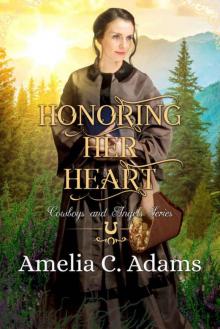 Honoring Her Heart
Honoring Her Heart Buttons and Bows
Buttons and Bows An Agent for Emily
An Agent for Emily Christmas Catch-Up VIII (River's End Ranch)
Christmas Catch-Up VIII (River's End Ranch) A Rancher for Rowena
A Rancher for Rowena Candice (Seven Sisters Book 6)
Candice (Seven Sisters Book 6) Butterfly Kisses
Butterfly Kisses A Stitch in Time
A Stitch in Time Buttons and Bows (The Sewing Circle Book 3)
Buttons and Bows (The Sewing Circle Book 3) Sidearms and Songbirds (Hearts of Nashville Book 3)
Sidearms and Songbirds (Hearts of Nashville Book 3) Herd to Breathe
Herd to Breathe The Ties That Bind
The Ties That Bind Rhyme or Reason
Rhyme or Reason Revelations (Brody Hotel Book 4)
Revelations (Brody Hotel Book 4) Phoebe's Fate (Burnt River Contemporary Western Romance Book 9)
Phoebe's Fate (Burnt River Contemporary Western Romance Book 9) And Something Blue (Main Street Merchants Book 1)
And Something Blue (Main Street Merchants Book 1)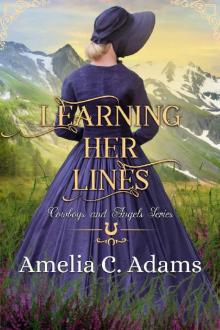 Learning Her Lines
Learning Her Lines Connections
Connections The Turn of a Wheel (Kansas Crossroads Book 17)
The Turn of a Wheel (Kansas Crossroads Book 17) Just Desserts (Main Street Merchants Book 4)
Just Desserts (Main Street Merchants Book 4) An Agent for Anna
An Agent for Anna An Agent for Esme
An Agent for Esme A Handyman for Helen
A Handyman for Helen Scented Sensibility
Scented Sensibility Addie's Adventurer
Addie's Adventurer Defying the Darkness
Defying the Darkness Riding the Rails
Riding the Rails Sugar And Spice (Main Street Merchants Book 7)
Sugar And Spice (Main Street Merchants Book 7) An Agent for Cynthia
An Agent for Cynthia In The Stars (Main Street Merchants Book 6)
In The Stars (Main Street Merchants Book 6) Moonlight With Alice (The Matchmaker's Ball Book 3)
Moonlight With Alice (The Matchmaker's Ball Book 3) Five Golden Rings (Main Street Merchants Book 3)
Five Golden Rings (Main Street Merchants Book 3) Between The Lines (Main Street Merchants Book 5)
Between The Lines (Main Street Merchants Book 5)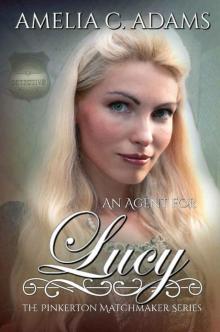 An Agent for Lucy
An Agent for Lucy Jessica (Seven Sisters Book 2)
Jessica (Seven Sisters Book 2)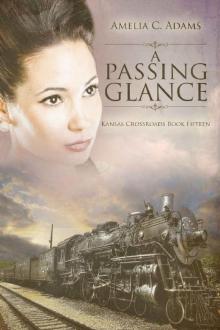 A Passing Glance
A Passing Glance Pet Peeves
Pet Peeves RNWMP: Bride for Joel
RNWMP: Bride for Joel Bowing to Betsy (The Matchmaker's Ball Book 11)
Bowing to Betsy (The Matchmaker's Ball Book 11) Rebekah (Seven Sisters Book 4)
Rebekah (Seven Sisters Book 4) A Joyful Noise (Kansas Crossroads Book 14)
A Joyful Noise (Kansas Crossroads Book 14) Her Second Chance Hometown Groom
Her Second Chance Hometown Groom A Christmas Promise (Kansas Crossroads Book 16)
A Christmas Promise (Kansas Crossroads Book 16)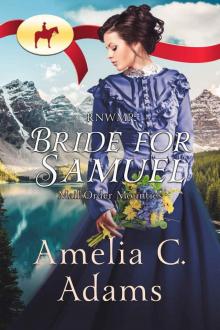 Bride for Samuel
Bride for Samuel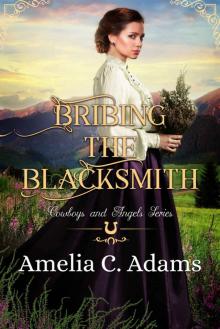 Bribing the Blacksmith (Cowboys and Angels Book 9)
Bribing the Blacksmith (Cowboys and Angels Book 9)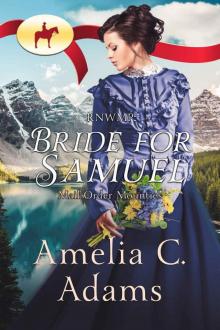 RNWMP: Bride for Samuel (Mail Order Mounties Book 12)
RNWMP: Bride for Samuel (Mail Order Mounties Book 12) Tea for Two
Tea for Two The Bitter and the Sweet (Kansas Crossroads Book 9)
The Bitter and the Sweet (Kansas Crossroads Book 9) Frank (Seven Sons Book 6)
Frank (Seven Sons Book 6) A Cattleman for Cora
A Cattleman for Cora Paislee's Path (River's End Ranch Book 48)
Paislee's Path (River's End Ranch Book 48) Accidental Agent (River's End Ranch Book 3)
Accidental Agent (River's End Ranch Book 3)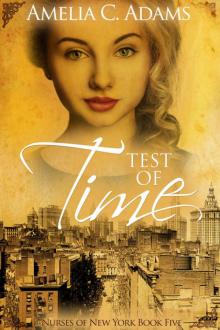 Test of Time (Nurses of New York Book 5)
Test of Time (Nurses of New York Book 5)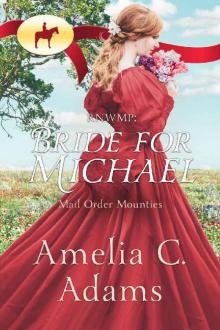 RNWMP: Bride for Michael (Mail Order Mounties Book 24)
RNWMP: Bride for Michael (Mail Order Mounties Book 24) Loving the Landlord
Loving the Landlord The Dark and the Dawn (Kansas Crossroads Book 3)
The Dark and the Dawn (Kansas Crossroads Book 3) Candy Crush
Candy Crush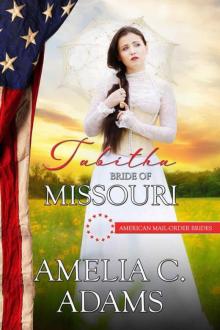 Tabitha: Bride of Missouri (American Mail-Order Bride 24)
Tabitha: Bride of Missouri (American Mail-Order Bride 24)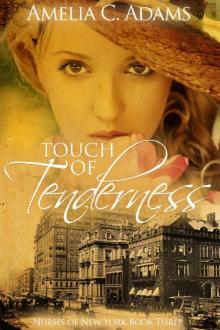 Touch of Tenderness (Nurses of New York Book 3)
Touch of Tenderness (Nurses of New York Book 3) Lucky Lifeguard (River's End Ranch Book 28)
Lucky Lifeguard (River's End Ranch Book 28) Heartstrings (Brody Hotel Book 2)
Heartstrings (Brody Hotel Book 2) Heart of Hearts (Nurses of New York Book 4)
Heart of Hearts (Nurses of New York Book 4) Hope_Bride of New Jersey
Hope_Bride of New Jersey A Careless Wind (Kansas Crossroads Book 7)
A Careless Wind (Kansas Crossroads Book 7) An Agent for Emily (The Pinkerton Matchmaker Book 28)
An Agent for Emily (The Pinkerton Matchmaker Book 28) A Twisted Fate
A Twisted Fate Delivering Destiny (River's End Ranch Book 23)
Delivering Destiny (River's End Ranch Book 23)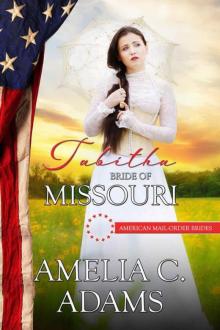 Tabitha_Bride of Missouri
Tabitha_Bride of Missouri A Wrangler for Wynonna
A Wrangler for Wynonna RNWMP_Bride for Peter
RNWMP_Bride for Peter An Unspoken Dream (Kansas Crossroads Book 13)
An Unspoken Dream (Kansas Crossroads Book 13) Generations
Generations Utah Sunrise (Rocky Mountain Romances Book 1)
Utah Sunrise (Rocky Mountain Romances Book 1) Bride for Jonathan
Bride for Jonathan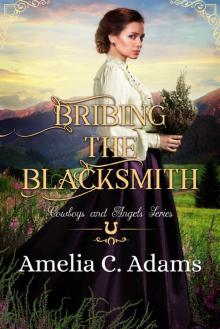 Bribing the Blacksmith
Bribing the Blacksmith A Clean Slate (Kansas Crossroads Book 4)
A Clean Slate (Kansas Crossroads Book 4) Hope: Bride of New Jersey (American Mail-Order Brides 3)
Hope: Bride of New Jersey (American Mail-Order Brides 3) Rugged Rockclimber (River's End Ranch Book 8)
Rugged Rockclimber (River's End Ranch Book 8)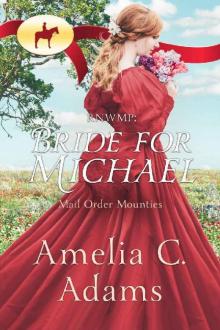 RNWMP_Bride for Michael
RNWMP_Bride for Michael RNWMP: Bride for Joel (Mail Order Mounties Book 4)
RNWMP: Bride for Joel (Mail Order Mounties Book 4) Tea For Two (Cowboys & Angels Book 15)
Tea For Two (Cowboys & Angels Book 15) Sweet Georgia Peach
Sweet Georgia Peach RNWMP: Bride for Peter (Mail Order Mounties Book 20)
RNWMP: Bride for Peter (Mail Order Mounties Book 20) A Clear Hope (Kansas Crossroads Book 5)
A Clear Hope (Kansas Crossroads Book 5) Meredith's Mistake (Grandma's Wedding Quilts Book 4)
Meredith's Mistake (Grandma's Wedding Quilts Book 4)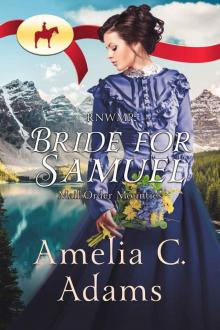 RNWMP_Bride for Samuel
RNWMP_Bride for Samuel The Whisper of Morning (Kansas Crossroads Book 6)
The Whisper of Morning (Kansas Crossroads Book 6) RNWMP: Bride for Jonathan (Mail Order Mounties Book 8)
RNWMP: Bride for Jonathan (Mail Order Mounties Book 8) Santa's Shopkeeper (River's End Ranch Book 18)
Santa's Shopkeeper (River's End Ranch Book 18)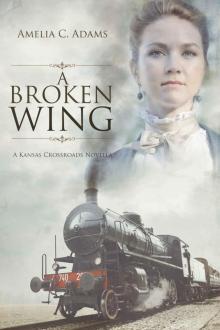 A Broken Wing (Kansas Crossroads)
A Broken Wing (Kansas Crossroads)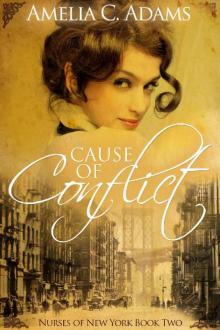 Cause of Conflict (Nurses of New York Book 2)
Cause of Conflict (Nurses of New York Book 2) A Free Heart
A Free Heart A New Beginning
A New Beginning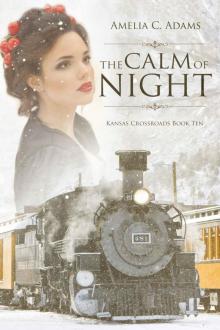 The Calm of Night (Kansas Crossroads Book 10)
The Calm of Night (Kansas Crossroads Book 10)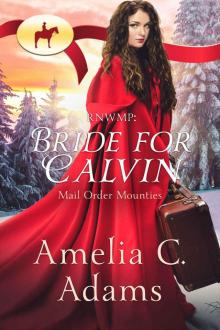 Bride for Calvin
Bride for Calvin Sea of Strangers (Nurses of New York Book 1)
Sea of Strangers (Nurses of New York Book 1)